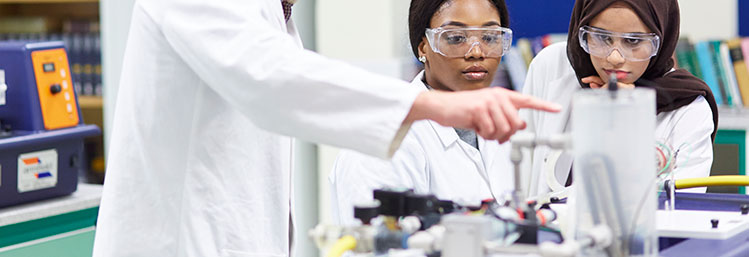
Chemical Engineering
MEng (Hons)
- Typical offer for 2025
- Duration
- UCAS code
- Start date
- Location
Suitable for applications.
We’ve employed several students from Bradford, who have all completed 12-month work placements. Employing students enables us to bring in new skills and future-proof the business. The students from Bradford bring fresh ideas, as well as knowledge about new technologies and processes, which they pass onto our employees. And our employees pass on their experience of working at a chemical manufacturing site.
Placement Year
This Chemical Engineering programme offers you the opportunity to take up a placement year working in industry in your third year.
The placement year is an excellent way to develop your professional experience, build industry contacts, and gain insight into the day-to-day work of a professional chemical engineer.
During the second year we’ll offer you all the support you need to find a placement that is aligned to your career aspirations and personal interests. These include sessions on CVs, interviews etc. from the Careers service at the University and presentations by both employers and previous year's students on their placements. Once on placement you’ll have support and guidance from a placements tutor, who will monitor your progress.
Our students have undertaken placements with organisations such as:
- EDF Energy
- Novartis
- Thames Water
- AMEC
- BASF
- Sellafield
- Tracerco
After completing your placement you’ll return to complete the final year of the programme, and apply all you’ve learnt to your final project. Many students continue their relationship with their placement employers, working for them part-time or returning to work in graduate positions after finishing their studies.
Teaching, learning and assessment
Your learning experiences are varied – a mixture of:
- formal lectures
- practical lab sessions
- tutorials and seminars
- group work
- computer based learning
- coursework
- poster and oral presentations
Independent study is supported by our virtual learning environment, Canvas. Reading lists and suggested resources for independent study provide you with clear direction, while regular contact hours and informal feedback throughout the course provide all the support you may need.
Assessments will include formal exams, class tests, lab reports, coursework, research reports, computer based assessment, quizzes, poster and oral presentations. Practical skills are assessed via individual and group technical reports with the laboratory work linked with the taught modules.

Study abroad
A study abroad year is a fantastic opportunity to broaden your horizons, build connections with people from different backgrounds and cultures, and strengthen your skills and experience to make you stand out in the job market.
We have opportunities for students to study, work or volunteer in more than 150 countries across the world and will support you every step of the way.
Study support
A Personal Academic Tutor (PAT) will be assigned to you to support you throughout your studies. You will have weekly meeting with your PAT, who will be an independent source of advice and guidance on making the transition to Higher Education and assisting you with any questions or problems you may encounter. The same tutor and tutees are paired in the second year.
In their final year of study the project supervisor takes over the personal tutor role. Weekly drop-in mathematics tutorials are available for Stage 1 students to help students with tutorial and coursework questions and to clear up difficulties that students have with mathematical topics taught in class.
In addition to standard study support through taught sessions, our Virtual Learning Environment (Canvas) allows you to access resources, participate in group work and submit work from anywhere in the world 24/7. The University central services are rich with support teams to assist you with every aspect of your journey through our degree courses.
From our Career and Employability Service, through our strong Students' Union, to our professional and efficient Student Finance team, there are always friendly faces ready to support you and provide you with the answers you need.
Research
Terms and conditions of study
The University has a set of terms and conditions for all students accepting an offer to study on a course here at Bradford. This is called The Student Contract. This document sets out the Terms and Conditions which apply when you accept an offer of a place on a programme of study at the University of Bradford.
View our Student Contract for further details.
Transparency statement
Information about this programme and its modules has been published in advance of the academic year to which it applies. Every effort has been made to ensure that the information is accurate at the time of publication, but changes may occur given the interval between publishing and commencement of teaching. Any change which impacts the terms and conditions of an applicant’s offer will be communicated to them.


